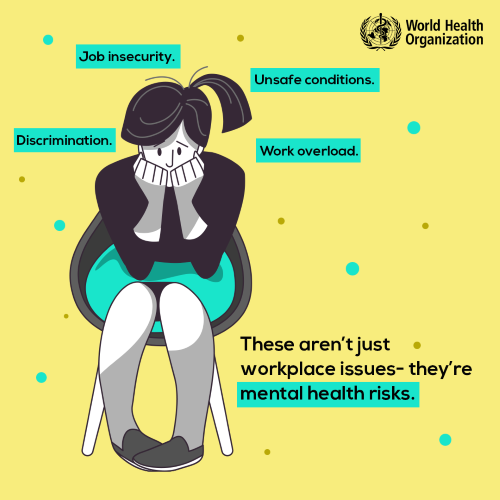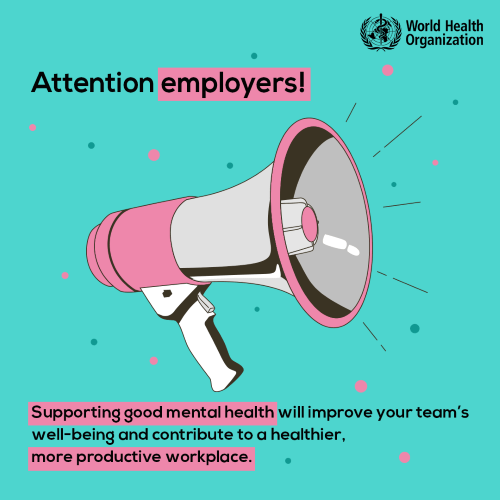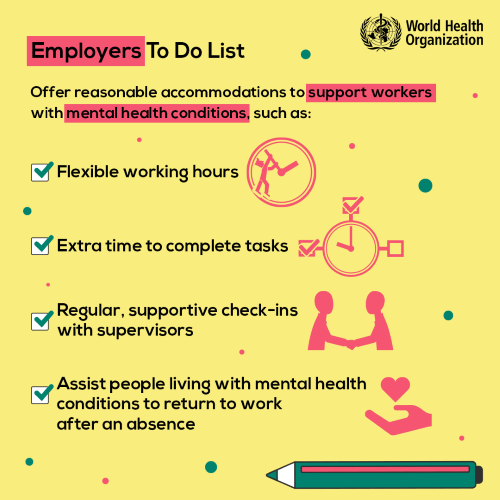Work is a significant part of our lives, but for many, it’s a source of stress and mental health challenges. This year’s World Mental Health Day theme, “Mental Health at Work”, shines a light on the vital role that workplaces play in either supporting or hindering our mental well-being. World Mental Health Day is recognized annually on October 10th across more than 150 countries. It is an international day to promote awareness and advocate for those struggling with mental health issues. Let’s delve into the factors contributing to poor mental health at work and explore how employers and employees can work together to create healthier environments.
Negative Workplace Factors Impacting Mental Health

Many aspects of modern work environments can negatively affect mental health. From toxic cultures to unrealistic workloads, these stressors often contribute to anxiety, burnout, and disengagement, making it harder for individuals to perform well and maintain their well-being.
Toxic Work Environments
A toxic workplace is rife with negativity, including poor leadership, bullying, and lack of support. Employees in such settings often feel undervalued or disrespected, leading to anxiety and depression. Toxicity may manifest in micromanagement, unrealistic expectations, or even outright discrimination. The constant fear of making mistakes or being reprimanded for minor errors further aggravates mental stress.
Long Hours and Overwork
The glorification of “hustle culture” has contributed to a normalization of long working hours. However, excessive work often leads to burnout. When employees consistently work beyond their capacity, it disrupts work-life balance and contributes to chronic stress, fatigue, and even physical health problems like hypertension.
Unmanageable Deadlines and Excessive Pressure
High-pressure environments with constant deadlines can take a toll on employees. The need to meet tight deadlines fosters a culture of urgency, leading to feelings of inadequacy, guilt for not performing, and increased anxiety levels. When pressure becomes unrelenting, it negatively impacts not just work output but also personal well-being.
Underpay and Lack of Compensation
Feeling underpaid or undervalued is another significant contributor to poor mental health at work. Financial stress due to inadequate compensation, particularly when paired with long hours, can lead to resentment, dissatisfaction, and disengagement from work. Workers who feel their effort isn’t reflected in their paycheck often experience a sense of hopelessness.
Positive Changes Employers and Employees Can Make

Addressing these mental health struggles requires a proactive approach. Both employers and employees can take steps to foster a healthier, more supportive work environment.
Promoting Open Communication and Mental Health Awareness
Encouraging open conversations about mental health in the workplace is crucial. Employers should create spaces where employees feel comfortable discussing their struggles without fear of stigma or judgment. This includes providing access to mental health resources, organizing wellness workshops, and offering counseling services.
Fostering Flexible Work Environments
One of the most effective ways to support mental health is through flexible working arrangements. Offering remote work options or allowing employees to adjust their schedules can help reduce stress. Flexibility can alleviate some of the burdens caused by rigid work hours and excessive demands, promoting better work-life balance.
Recognizing and Reducing Workload Stress
Employers need to regularly assess workloads to ensure they are manageable. Employees should also feel empowered to speak up if their workload becomes overwhelming. By setting realistic deadlines, limiting after-hours work, and distributing tasks evenly, employers can prevent burnout and foster a healthier, more productive workforce.
Providing Fair Compensation and Acknowledgment
Ensuring fair pay and recognizing employee contributions can improve workplace morale and motivation. Acknowledging hard work – whether through bonuses, promotions, or verbal appreciation – helps employees feel valued, reducing resentment and disengagement.
Creating Inclusive and Supportive Environments
Diversity and inclusivity play a vital role in promoting mental health. Employers must actively address workplace discrimination and ensure that all employees – regardless of background – feel supported and respected. Inclusive environments where individuals can be their authentic selves are key to fostering well-being.
World Mental Health Day Lessons

Mental health in the workplace isn’t just an individual concern; it’s a collective responsibility. As the World Health Organization calls on governments, employers, and workers to unite for better mental health at work, this World Mental Health Day is a timely reminder of the changes needed to protect and support mental well-being. By addressing toxic environments, offering flexibility, and ensuring that every employee feels valued, we can create workplaces where everyone thrives – not just survives.
Let’s make the commitment to promote mental health at work, starting today.
If you’re looking to work on the front lines helping those struggling with mental health, the Addictions and Community Service Worker Diploma program at ABM College is an excellent place to start. It is one of many Healthcare programs offered by ABM, and focuses on providing support to those in need.
You can also read more exciting Blogs right here.
About The Author

Content Editor
Stephen Emond is an award-winning author and a content editor. He has broad experience in content development, copy editing, journalism, marketing, and information technology spanning a variety of industries. He has published a series of best selling historical reference guides covering decades of computer and video gaming history. Stephen is currently working as a Content Editor and Writer at ABM College.
